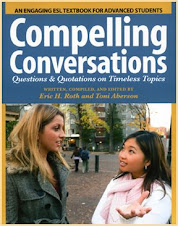Sunday, November 14, 2010
TOEFL, TOEIC, and jobs « Readable Blog
TOEFL, TOEIC, and jobs « Readable Blog
As somebody who has often criticized - even ranted against - the overuse and misuse of standardized exams, consider me quite sympathetic of your analysis. It's also worth noting that no outside study has even found a correlation between TOEFL scores and actual academic performance in either university or graduate school. Although I'm less familiar with the TOEIC, it seems to share many of the perceived advantages for large institutions (test consistency, convenience, cost) and the same disadvantages (artificial context, limited scoring, weak correlation with alleged goals, excessive test preparation).
Having said all that, it seems a tad unfair to attack the TOEIC as " still not perfect or very realistic." Not perfect? Isn't that asking for far too much? No standardized test - and very few human endeavors - are "perfect." Noting the TOEIC is not "very realistic" in the next phrase only adds some irony to the critique. May I suggest it "not realistic" to expect any exam to be "perfect"?
Further, I'm not sure that we can wish away either the TOEIC or TOEFL or just advise our students to disregard the results. As an experienced TOEIC and TOEFL teacher, you have seen - first hand - the power to open doors or defer dreams that these strange standardized exams continue to hold. Scores matter. ETS holds real power. Power must be recognized.
Let us, instead, speak truth to power as your fine article does - and prepare students to develop their authentic English skills. For instance, I would recommend students both study for the TOEIC with both a traditional test prep book and the multiskill Target Score (Cambridge University) that correlates authentic newspaper articles to TOEIC vocabulary. In other words, we need to both help our students raise their scores and authentic English communication skills in the short run. TOEFL and TOEIC scores matter. We must be realistic in our counseling to students.
Of course, we also need to find ways to reduce the influence of standardized exams in both international companies and educational institutions, but that is a very daunting, difficult challenge. I would prefer, for instance, that universities supplement the TOEFL with their own language tests - especially for speaking skills. Videotaping a 10-15 minute interview, for instance, can fairly accurately assess student speaking skills and conversational abilities.
I deeply appreciate the author's profound misgivings about both the TOEFL and TOEIC. Far too few English teachers seem willing to note that the ETS emperor has far too few clothes on!
Ask more. Know more. Share more.Create Compelling Conversations.Visit www.CompellingConversations.com
Tuesday, May 20, 2008
Do you teach the difference between "a" and "the" in conversation class?
Does teaching articles (a, an, the) make sense in a conversation class?
Context matters.
Conversation class should encourage English students to express their ideas, practice familiar words and syntax, and develop greater confidence in effectively communicating in English. Content remains king. Given how little most of our ESL students speak English outside of classes, we need to provide many speaking opportunities for them to develop greater fluency.
Starting from these assumptions, I generally prefer indirect correction of student errors during conversation class. I often circle around a class, listen in, join small discussion groups, and make a few notes. If I hear some grammatical error, I usually demonstrate correct language – but without explicitly or publicly correcting the student.
This indirect correction – modeling the correct syntax – seems especially important with adult students with limited academic backgrounds. I prefer encouraging these sometimes reluctant, shy and often insecure students to insisting on perfect grammar.
Yet article errors matter in English, and provide what native speakers consider significant information. Just as some languages divide nouns or adjectives into masculine and feminine, English highlights the difference between a definite (or known) member of a group and an indefinite (or unknown) member of a group. Article errors are also very common – even with immigrants who have lived in the
After collecting overheard student errors during conversation lessons, I tend to pick one “good mistake” and give several examples when the class comes back for a general discussion. It is here, more for college students and future college students, that I remind students of the differences between articles “a”, “an” and “the”. Because I teach in the
Create Compelling Conversations.
Visit www.CompellingConversations.com
Saturday, May 3, 2008
Word Lovers and World Lovers Should Visit FreeRice.Com
As the price of rice, corn, and other basic food staples increased daily and food riots return to the headlines, we might want to reflect on ways to help the world’s poorest poor. One way that English teachers, dedicated students, and idealists can make a small contribution is by visiting www.FreeRice.com .
This outstanding educational site asks a wide range of vocabulary questions that often appear on standardized exams. Are you studying for the TOEFL, TOEIC, SAT, LSAT, or GRE? Are you trying to expand your English language vocabulary? Do you know relatives, friends, or co-workers in poor countries? Are you an English student, an ESL teacher, a language school administrator, or a global citizen? FreeRice provides practical assistance to adult education students, ESL teachers, immigrants, test takers, and refugees. FreeRice is a powerful vocabulary resource with 50 levels of vocabulary questions, and its addictive too!
Whether you are a word lover or a world lover, this site should appeal to you. For each correct answer, the site sponsors donate 20 grains of rice to the United Nations Food Program. Check Free Rice out, test your vocabulary skills, and make a small – yet significant – contribution today. Thanks!
“The satiated man and the hungry man do not see the same thing when they look upon a loaf of bread.”
Rumi (1207-1273), Persian poet
Ask more. Know more. Share more.
Create Compelling Conversations.
Visit www.CompellingConversations.com





